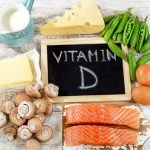
A common question in my clinic is “Should I be taking a Vitamin D supplement?” Everyone living in the UK is at greater risk of vitamin D deficiency, making it one of the most common nutrient deficiencies in the Northern Hemisphere. We are advised to take additional vitamin D in Autumn and Winter by NHS England; however, many medics are now recommending that vitamin D is taken all year round to ensure adequate levels.
We have vitamin D receptors on almost all of the cells of our body. This shows us the importance that vitamin D has in our body and just how necessary it is.
PRINT VERSION – CLICK HERE
Who is Most at Risk from Vitamin D Deficiency?
While some people are more at risk of deficiency than others, the fact remains that in Autumn and Winter the natural sun rays are still too weak to support optimal vitamin D production. It is estimated that around 20% of the UK population has a deficiency in vitamin D, however the true number may be much higher if we include those with sub-optimal levels. Individuals most at risk include:
- Children
- Pregnant or breastfeeding women
- The elderly
- Those with darker skin tones such as those of Asian or Afro Caribbean heritage
- Anyone who spends little time outdoors
- Night shift workers
- Those who cover their skin with clothing all year
What is the Advice for Vitamin D levels?
In an ideal world, we would all know our vitamin D levels, which would give us a better idea how much to supplement to keep blood levels within an optimal range. While we offer vitamin D testing in our nutrition clinics, many people do not have access to this testing, although there are a number of online clinics emerging, offering pin prick home test kits.
Currently it is recommended to take between 400-4000IUs daily for adults and no more than 2000IUs daily for children (1000IUs is considered safe for most children, but this is dependent on age, so please check before supplementing children).
What is Vitamin D and How Does it Differ from Other Vitamins?
While we can still consume some vitamin D from diet, it is also different from other vitamins because most of our vitamin D is manufactured by our body. To be more accurate, vitamin D is a steroid hormone, manufactured from cholesterol when our skin is exposed to UVB in direct sunlight. Since very few foods contain meaningful amounts of vitamin D, we are dependent on the sunlight to keep our natural vitamin D levels up. But, because vitamin D is a fat-soluble vitamin, we can also store it in our body.
Nutritional Sources of Vitamin D
Natural food sources include oily fish, egg yolk, organ meats, cod-liver oil, full fat dairy and butter, but with the exception of cod-liver oil capsules, these only provide minimal amounts of Vitamin D.

Why do we need vitamin D?
Vitamin D works on multiple systems in the body, which is why deficiency symptoms can be so diverse. One of vitamin D’s main roles is for the correct absorption of calcium and phosphorus, which supports healthy bones, teeth and muscles. Insufficient vitamin D can make calcium absorption extremely challenging for the body.
Vitamin D also helps to strengthen our immune system and research has linked vitamin D with helping to protect us against colds, flu and viruses such as Covid-19, as well as reducing risk for various autoimmune diseases such as Multiple Sclerosis, inflammatory bowel disease or rheumatoid arthritis.
Vitamin D also helps to regulate our mood and supports mental health. More recently it has been associated with gut integrity, overseeing ‘kissing junctions’ in the gut wall, which act as a form of border control, restricting the size of molecules that are able to cross from the gut into the bloodstream.
What are the Symptoms of Vitamin D Deficiency?
A lack of vitamin D has been linked to weaker bones and teeth but more recently research has associated low levels with cardiovascular disease, low mood, depression, autoimmune disorders, cancer, diabetes, inflammation, neurological disease and reduced immunity.
Because we need vitamin D to absorb calcium, deficiency could lead to rickets in children as well as osteopenia and osteoporosis in adults. It can also result in low mood and depression alongside the increased risk of infections (with both greater severity and longer duration) as well as an increased risk of autoimmune conditions.
Do We All Need the Same Amount of Vitamin D?
Our cells carry vitamin D receptors called VDR-receptors. These receptors pick up the vitamin D from our bloodstream and allow it to enter our body cells. These receptors are influenced by our genetics, and it is believed that the genes governing our VDR receptors can influence around 70% of our bone density. These genetic differences mean that some people may have a much higher requirement than others and may find that they need to supplement more to maintain healthy vitamin D levels in the blood.
Supplementation is dependent on our current blood values and our age and needs to take into account total daily intake from food, as well as a combined amount from different vitamin and mineral supplements, which may all contain small amounts of vitamin D.
How Much Vitamin D is Enough?
This is normally achieved from a simple blood test. Vitamin D is measured in nmol/l in our blood, where:
<25 nmol/L -clinical deficiency
25-50 nmol/L- insufficiency
50-75 nmol/L– adequate
75-150 nmol/L – optimal
How Much to Supplement?
This is a difficult question to answer as it needs to take into account our current blood levels, our genetic requirements (VDR-receptors) and whether we belong to a high-risk group.
Public Health England states that everyone over the age of 4 should take 400IUs or 10micrograms vitamin D daily, all year round. However, scientists globally are now reporting that 400IUs may be insufficient to keep our blood levels of vitamin D within the optimal range. For this reason, upper daily levels have been set that are usually around 2000ius for children and around 4000IUS for adults. These are supplementation levels that are most likely to keep us within a healthy range. It also makes sense to check our vitamin D levels annually with a GP, a private laboratory or from a pin prick home test.
What is the recommended amount of vitamin D for women?
There is no difference in recommended daily amounts for women or men. See amounts above. The only difference in daily amounts would be for children of different ages.
What nutrients work best with vitamin D?
Not to be confused with vitamin K1, vitamin K2, or menaquinone, is made by the bacteria that line our gastrointestinal tract. Since our gut flora has much less diversity than ever before, due to a more processed diet and the use of antibiotics, we cannot guarantee our own production of K2. Whereas vitamin D3 helps with the absorption of calcium, vitamin K2 is one of the most important nutritional interventions for improving bone density as it behaves as the biological “glue” that helps keep calcium and other important minerals into the bone matrix.
Higher doses should be used with caution for people taking anticoagulant medication as K2 can play a role in blood clotting. For healthy adults, it is usually better to take vitamin K2 alongside vitamin D3 as they work in tandem in the body.
Our bones also require other minerals such as magnesium, zinc, boron, phosphorus and manganese which are found in whole foods.
Can I have too much vitamin D?
The information provided here is given for healthy individuals, however, it is not personalised advice. Please speak to a health professional if you are unsure. There are small groups of people who may not be able to take vitamin D, such as those who already take it on prescription or those with a health condition such as parathyroid disease. It is important to consider overall consumption of vitamin D3 from various sources, such as cod-liver oil, multivitamins, supplements etc. as this could lead to someone accidentally taking more than the upper daily limit.
Vitamin D foods for vegetarians and vegans
Food sources of vitamin D are still quite limited, and it would be almost impossible to reach our daily requirements through foods alone. This would exclude sources such as cod-liver oil, oily fish and organ meats. Vegetarian sources of vitamin D would include egg yolks and cheese. Plant-based sources are rare, except in certain mushrooms that have been exposed to UV light or foods fortified with vitamin D, such as some plant-based milks. Unfortunately, consuming these foods is mostly a supplementary source of vitamin D and should not be the main source.
Final words
To answer the question “Should I be taking a Vitamin D supplement?”, it seems sensible advice that everyone in the UK should be thinking about their vitamin D levels and considering supplementation.
I personally like the mouth sprays from a company called Better You who offer vitamin D mouth sprays, with and without vitamin K2, for all ages. I have no affiliation with this company but know that many people find them to be the easiest way to take this vital vitamin daily.
It is possible to test our genetic variations for our VDR-receptors. In clinic at Dominique Ludwig Nutrition and Meyer Clinic, Chichester. Here we can assess these as part of our DNA Health Screen. Genetic tests can be carried out at home from a pin prick test and sent to our laboratory for analysis. Please send us a message if you are interested in this.
About Dominique Ludwig, Nutritionist MSc and Nutritional Therapist mBANT
Dominique Ludwig is an accomplished Nutritionist with over 30 years’ experience as a qualified nutritionist and 16 years as a nutritional therapist. The secret weapon of many high-profile clients and A-list celebrities, Dominique has been voted one of the top 15 nutritionists in the UK.
She is the founder of the Nutrition and Lifestyle Programme Renew Reset Recharge®. This is a pioneering nutrition, weight management and lifestyle programme all rolled into one. Working out of her busy practice and The Meyer Clinic, Dominique has helped over a thousand clients, globally, live healthier lives. She is a regular contributor to The Times, The Sunday Times and Times 2.
To work with Dominique, either contact her via Dominique Ludwig website or book a free DISCOVERY CALL
DISCLAIMER
Features published by Dominique Ludwig are not intended to treat, diagnose, cure or prevent any disease. Always seek the advice of your GP or another qualified healthcare provider for any questions you have regarding a medical condition, and before undertaking any diet, exercise or other health-related programme.
References
Bikle, D.D. (2016) “Extraskeletal actions of Vitamin D,” Annals of the New York Academy of Sciences, 1376(1), pp. 29–52. Available at: https://doi.org/10.1111/nyas.13219.
Kow, C.S., Hadi, M.A. and Hasan, S.S. (2020) “Vitamin D supplementation in influenza and covid-19 infections comment on: ‘evidence that vitamin D supplementation could reduce risk of influenza and COVID-19 infections and deaths’ nutrients 2020, 12(4), 988,” Nutrients, 12(6), p. 1626. Available at: https://doi.org/10.3390/nu12061626.
Ying Chih Cheng, Yu Chen Huang et al/ “The effect of vitamin D supplement on negative emotions: A systematic review and meta-analysis” Meta Analysis. Depress Anxiety 2020 Jun;37(6):549-564. Available at https://pubmed.ncbi.nlm.nih.gov/32365423/




